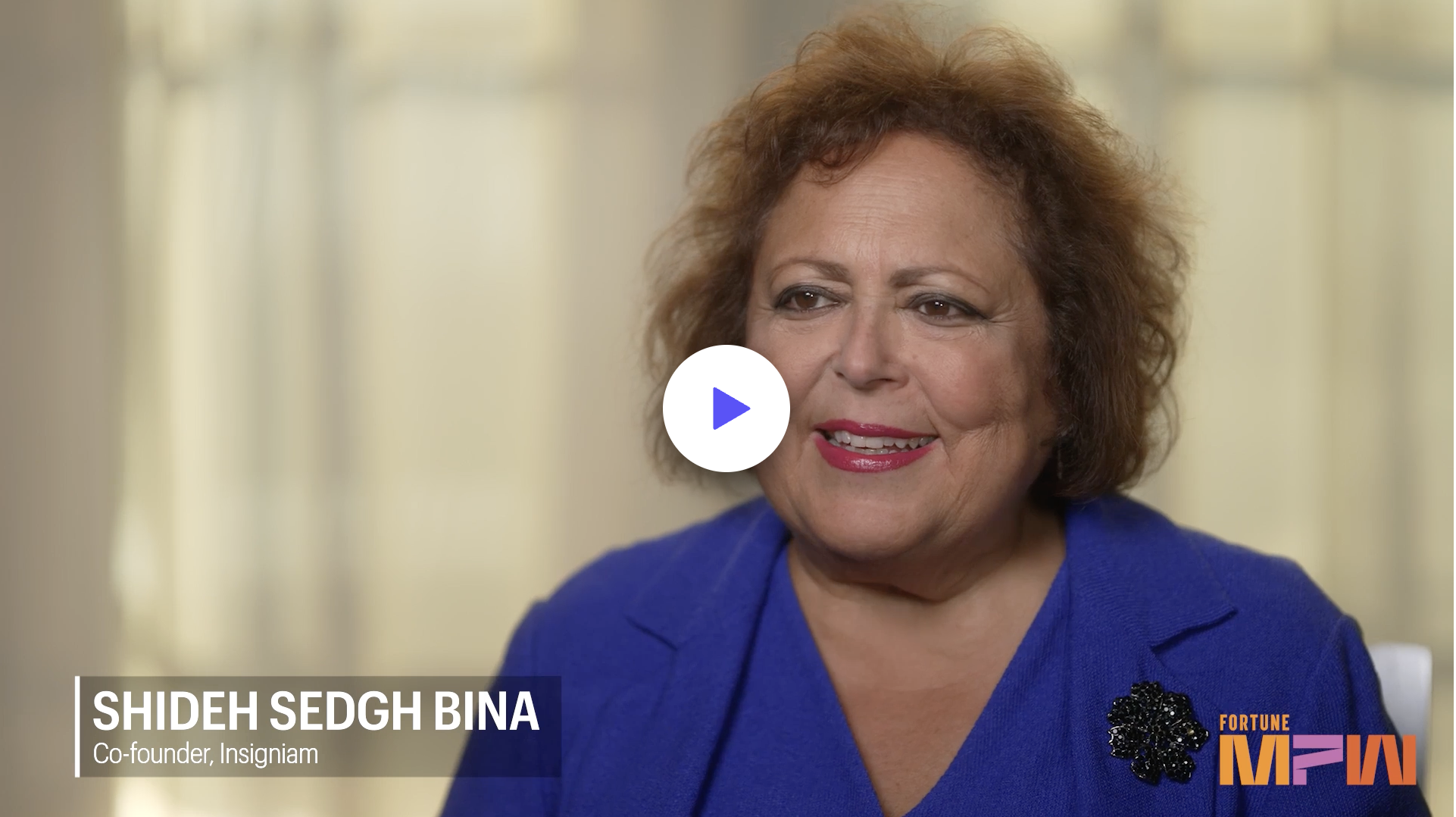Impact Players: Women of Courage
They are bold, innovative and risk-positive. They think big, confront challenges head-on and never, ever take the well-worn path. From marketing some of the biggest health care brands to creating environmentally conscious beauty products to navigating global supply chains, Sharon Callahan, Adele Gulfo, Jocelyn Konrad, Susan Comparato, Kate Assaraf, Tatiana Liceti, Nathalie Molina Niño and Régine Lucas are shaping their industries and setting the pace for future generations of female leaders.
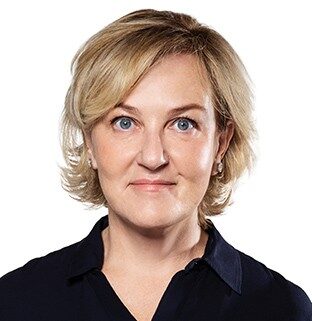
Sharon Callahan
CEO, CDM and Chief Client Officer
at Omnicom Health Group
Point of Impact
Ms. Callahan approaches her personal and professional lives with straightforward honesty. When she and her female partner decided to have a baby, Ms. Callahan openly discussed her personal life with everyone at work.
What kind of leader is Sharon Callahan? The kind who does not pretend to have all the answers. The kind who tells aspiring women executives to stop being so humble and start exercising their self-confidence like a muscle. The kind who, a quarter-century ago, announced to her business associates that she is gay.
“What I learned is that doing the difficult thing makes your life so much easier.” —Sharon Callahan
Ms. Callahan is not afraid to be herself.
“I don’t know how else to be,” she says. “I think it starts with being authentic.”
Since March, Ms. Callahan has been at the helm of CDM, an agency in New York City that handles marketing and communications for some of the biggest names in health care, including Bayer, Merck and Pfizer. CDM is part of Omnicom Health Group, a holding company that owns more than a dozen communications firms specializing in health, wellness and medicine.
Before taking over at CDM, she was CEO of Omnicom-owned TBWA\WorldHealth. Her leadership at that once-struggling firm earned her industry accolades, including the 2019 Woman of the Year award from the Healthcare Businesswomen’s Association.
At Omnicom, she has earned a reputation as a turnaround specialist. Twice Ms. Callahan was dispatched to revive struggling brands. That includes CDM, which was beset with a combination of leadership issues and financial underperformance. She took control of the company at the start of a global pandemic and immediately realized she needed to make some layoffs.
Ms. Callahan says she dealt with that in the manner that has defined her career: She was honest with the staff.
“At work, I haven’t really avoided the tough things, and maybe that’s part of my success, too,” she says. “It’s everybody’s nature. It’s what holds people back from being their best.”
She taught herself that lesson early in her career—a time, she notes, when “you couldn’t exactly be guaranteed you wouldn’t lose your job for being gay.”
Ms. Callahan says she was never “in the closet” at the office but did not discuss her personal life openly with everyone at work. Then, in 1995, she and her partner decided to have a baby. She anticipated the likely comments: “Oh, I didn’t know you were married.” Or “How did that happen?”
“I said to myself, ‘You can’t be a mother and be honest and bring up your child the way you want to and be in the closet.’ Now, I think the bravest thing was deciding to have a child,” she says.
“What I learned is that doing the difficult thing makes your life so much easier.” Share on X She has extended that philosophy to her professional life, where one of the “difficult things” she did was to examine the lack of racial diversity at TBWA\WorldHealth. Ms. Callahan brought in Madison’s Collective, a nonprofit formed by high-ranking minority advertising executives, to figure out why the company did not hire more people of color—and what leaders could do to change that.
To many people in her industry, she is a role model. Ms. Callahan leads with quiet confidence, holding high expectations for her employees (and herself ) amid an atmosphere of collaboration, inclusiveness and openness.
“When you open yourself to people, they feel inspired by who you are and what you do. I always say, ‘All right, I’m going to make the best decision that I can today. And if it doesn’t work, then I’ll have to make a different decision tomorrow.’ But that’s all anybody can be expected to do—show up and be your best every day and take responsibility for when you don’t make the right decision.”
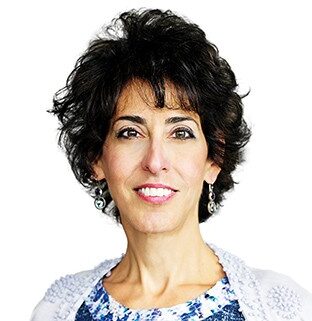
Adele Gulfo
Chief Business and Commercial Development Officer,
Sumitovant Biopharma,
and Interim Chief Commercial Officer,
Myovant Sciences
Point of Impact
Ms. Gulfo believes in “listening to the science,” which led her to fund a massive clinical trial of a promising drug with her department’s money when no one else would. To date, the drug has earned tens of billions of dollars.
The defining moment in Adele Gulfo’s career arrived relatively early—in her late 30s, a good two decades removed from her current positions at Sumitovant Biopharma and Myovant Sciences. Although she did not know it at the time, her determined leadership would lead to the development of one of the nation’s top pharmaceutical products.
It was the early 2000s, when she was vice president of drugmaker AstraZeneca’s cardiovascular division. Ms. Gulfo was responsible for the commercial prospects of a cardiovascular drug that her team of cardiologists, intravascular surgeons and research scientists believed could produce dramatic results for patients with high cholesterol levels.
“At the end of the day, a great leader has to see the beginning with the end in mind. I saw what that end could be and I had to fight for it.” —Adele Gulfo
Ms. Gulfo, a former lab scientist herself, asked AstraZeneca’s research and development team to pay for a massive clinical trial. And it would cost tens, if not hundreds, of millions of dollars.
“They all said, ‘Great theory, great hypothesis, but it’s too expensive. We don’t want to pursue it.’ I said, ‘We have to pursue it. This is game changing.’”
The R&D team was unpersuaded and turned her down. What else could Ms. Gulfo do except fund the trial using her department’s budget?
“I was young and I just felt that’s what I needed to do,” says Ms. Gulfo. “I had several external KOLs [key opinion leaders] supporting me. I was listening to science and the KOLs that I had learned from during my years working on the launch and commercialization of LIPITOR.”
In the two decades since, she never stopped “listening to science”—most recently while holding down two full-time jobs. She has held her primary role with Sumitovant Biopharma since the company was formed in January, the result of a $3 billion deal between Roivant Sciences and Sumitovant parent Sumitomo Dainippon Pharma. From 2009 to 2014, she was president of Pfizer’s U.S. and Latin American divisions.
Under her leadership, she oversaw the launch and growth of a portfolio of drugs that improved the lives of millions of people—which is what pulled her out of the lab and into the corner office.
Since May, Ms. Gulfo also has managed her team at New York- and London-based Sumitovant while serving as interim chief commercial officer for Myovant Sciences, which Sumitovant partially owns.
Leadership came naturally to Ms. Gulfo. She always has been a collaborator and a relationship builder. She is also confident enough to know what she does not know and to seek others’ opinions.
“Scientific training is great. We seek to solve the problems we identify, and we’re analytical. That helps in solving big business problems and tackling challenges. But you need to complement that with humility.”
But back to that clinical trial Ms. Gulfo championed at AstraZeneca in the early 2000s. The trial worked so well that an independent monitoring board recommended in 2008 that AstraZeneca stop the trial years early due to “unequivocal evidence” of its success.
The drug? The groundbreaking cholesterol-lowering Crestor, which was AstraZeneca’s top revenue product until last year—earning north of $62 billion to date.
More importantly to Ms. Gulfo, Crestor has helped countless people enjoy better lives. The Crestor experience also taught her to heed her inner voice while listening to science.
“At the end of the day, a great leader has to see the beginning with the end in mind. I saw what that end could be and I had to fight for it.” Share on X
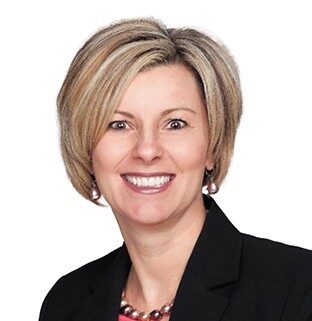
Jocelyn Konrad
Executive Vice President and Chief Pharmacy Officer,
Rite Aid
Point of Impact
In the early days of the COVID-19 pandemic, Ms. Konrad set up Rite Aid testing sites for first responders and health care workers. Soon after, she introduced testing sites for the public.
Jocelyn Konrad has faced a lot of challenges during her decades-long career in the pharmacy industry. Still, nothing compares to her present ordeal: helping the Rite Aid chain and its customers deal with the COVID-19 pandemic.
As executive vice president and chief pharmacy officer for Rite Aid, Ms. Konrad is reshaping how Rite Aid functions and serves both private- and public-sector customers.
Under Ms. Konrad’s leadership, Rite Aid opened its first COVID-19 testing site for first responders and health care workers on March 22, 2020. As of late August 2020, it is operating 264 testing sites in 15 states. She and her staff accomplished this as they were also figuring out how to keep Rite Aid pharmacies staffed and its employees safe.
“It comes with being passionate about learning, being curious, always wanting to find new things to experience within an organization.” —Jocelyn Konrad
“Grocery stores and drugstores—they are some of the only essential businesses that have been open for this entire time,” Ms. Konrad says. “It’s been crazy, chaotic, stressful and fulfilling at any given minute. We had so much thrown at us. It’s been an unprecedented time and I’m proud of how our team stepped up to meet the challenge.”
Rite Aid’s hundreds of pharmacists and staffers, Ms. Konrad says, made it through those early days of the pandemic because they were determined to continue serving their communities. The former athlete often delivers a thought-provoking message to any of her employees—pharmacists included—without the fire in their belly for community pharmacy.
“If you don’t want to be here and community pharmacy isn’t your thing, please go do something else. You’re not helping yourself or any of our customers,” she says. “Life is too darn short, and we should all enjoy at least the majority of it.” Share on X
Ms. Konrad’s mastery of the current situation is not surprising, given her ambitious personality.
Ms. Konrad has always been very driven. In seventh grade, she created a new cheerleading squad, then coached it. In the early years of her career, she was the employee who raised her hand for the difficult tasks. When she had kids, she was a working mom who made it look so easy.
So it is not surprising that a career that started behind a counter at a local drugstore has led her to the C-suite at Rite Aid, whose revenues exceeded $21 billion in 2019.
Ms. Konrad worked in hospitals and nursing homes, in retail stores and even a mall. For Rite Aid alone, she has been a district pharmacy manager, a regional pharmacy manager and a group vice president. That does not mean it has always been easy. Years ago, after the birth of her two children, she decided not to take on additional responsibilities or new challenges. She knew what her bandwidth and her husband’s work schedule would allow her to accomplish in one day, but still struggled with saying “no.”
Then one of her supervisors tapped her on the shoulder to lead the Rite Aid Health Alliance, a health management collaboration between the drug store and other health care providers. It was a risky proposition: Her kids were still young and the job involved traveling multiple days each week. But the opportunity was too good for her to pass up, so she and her husband made it work.
“That was probably one of the most courageous points in my career. It made me stronger because by doing that and jumping into that, I went, ‘Damn, I can do anything.’”
No matter where she has worked—Thrift Drug, Eckerd, Rite Aid—Ms. Konrad says she let the powers that be know she wanted to learn more, do more, be more. “It comes with being passionate about learning, being curious, always wanting to find new things to experience within an organization.”
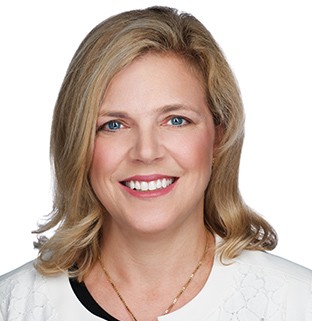
Susan Comparato
Senior Vice President U.S. and General Counsel,
Argo Group
Point of Impact
At Argo, Ms. Comparato has embraced new responsibilities, even if it means stepping outside of her comfort zone, because of her desire to learn and enhance her experiences.
Susan Comparato had just settled into her role as senior vice president and U.S. general counsel at Argo Group when she learned that she would be taking on even more responsibilities for the international insurance underwriter, which had $2 billion in revenue last year.
In early July 2020, not quite two years after she joined the company, Argo asked Ms. Comparato to lead its programs business, Argo transportation and alternative risk solutions—overall, yet another new experience.
And that, it seems, has been the story of her professional life. “I see myself as a model for what you can do with a law degree,” she says. “The overarching theme in my career is the desire to learn and enhance my experience and being at places that have allowed me to do that.”
“Sometimes a leader has to say to people, ‘I don’t have all the answers now, but here’s how I’m going to get the answers.’” —Susan Comparato
Like thousands of law school graduates before her, Ms. Comparato went to work for a large established firm after she earned her degree from William & Mary in 1994. Since then, she has worked as a legal specialist (in securitization transitions and other financial matters) and as a legal generalist (as in-house counsel for three companies). For the versatility required, she had to learn about many aspects of the law—from overtime rules and privacy to SEC rules and government regulations.
That was certainly true during her 16 years at Syncora Holdings, the reinsurance and financial guarantee insurance company where she worked before joining Argo. Initially hired in 2001 as an associate in-house counsel for one of the company’s subsidiaries, Ms. Comparato became acting CEO in November 2009, right in the middle of the Great Recession.
It was a tumultuous time for the financial sector and the company, which faced a ratings downgrade, a highly leveraged balance sheet and potentially large claims payments.
“The company had so many challenges—financial, liquidity, regulatory—that every morning I woke up thinking the New York Department of Financial Services was going to take us over,” says Ms. Comparato, who eventually was named Syncora’s president, CEO and board director. “That’s probably the most challenging and difficult thing I’ve gone through in my whole career.”
She worked with government regulators to restructure the company. She is credited with not only pulling Syncora off the edge of the financial cliff but also strengthening its ties to the regulatory community.
How did she do it? A combination of 18-hour workdays (she admits she worked too much) and not panicking around her team. She walked a fine line between keeping employees calm and communicating to them the severity of the situation—and, therefore, the need for them to work extremely hard and perform at an extremely high level. So she adopted a one-day-at-a-time approach: She reminded employees that all they could do was their very best and that the problems were not going to disappear overnight.
That, and celebrating every little bit of good news that came through the door. “You could focus on the negative events, but we’d focus the team on those wins,” she says. “You have to remember that as a leader, everyone’s watching you. You set an example.”
The experience, she says, taught her a valuable lesson: People appreciate it when their leaders speak openly and truthfully. Sometimes a leader has to say, ‘I don’t have all the answers now, but here’s how I’m going to get the answers. Here’s the work I’m going to do. Here’s the engagement I want from my employees.’ Share on X
“I found that vulnerability can be more effective than you would imagine.”
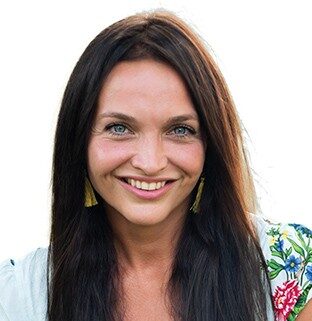
Kate Assaraf
Cofounder and CEO,
Nurture Our Amazing Planet (NOAP)
Point of Impact
Ms. Assaraf co-launched Nurture Our Amazing Planet, an environmentally conscious beauty products company, because of her vision of a plastic-free planet.
Kate Assaraf’s life changed a few years ago when she discovered that 91% of the world’s plastic is not recycled. The former beauty industry insider set out to rid her home of the stuff, trading plastic wrap and sandwich baggies for beeswax wraps and recyclable bags. She replaced her plastic graveyard of half-used shampoo and conditioner bottles with bars that she could rub into her wet hair.
But nothing on the market met Ms. Assaraf’s high standards for her long brown locks. She longed for a salon-quality product as good as Oribe or Pureology, two high-end liquid shampoos and conditioners she favored. After visiting message boards and talking to women in her running group, she realized that she was not the only one craving a better bar.
“I think there’s a weird personality quirk that problem-solvers or entrepreneurs have. I’ve heard it described as an unscratchable itch.” —Kate Assaraf
So, in 2019, Ms. Assaraf and her business partner, Mille Rodriguez, created NOAP (rhymes with soap) with the goal of producing environmentally friendly shampoo and conditioner bars. They spent the next 18 months perfecting product formulas that met Ms. Assaraf’s ultra-high-quality standards, using the best-available ingredients.
“I was laser-focused on performance,” Ms. Assaraf says. “With a name like NOAP, it cannot suck.”
An acronym for Nurture Our Amazing Planet, NOAP shipped its first bars in June—and, amid the COVID-19 pandemic, sold $30,000 in their first month with a marketing budget of zero dollars. The bars and other bath accessories are available on the company’s website (saynoap.com) and a handful of boutiques around the country.
With Ms. Rodriquez, who had previously worked with brands like EOS, Kate Spade and Sol de Janeiro, Ms. Assaraf also created accessories for the beauty products to handle the problem of storage (which they had anticipated). The environmentally friendly accessories include bamboo coasters, a four-shelf shower rack and a travel case suitable for the beach, gym or pool. The bamboo coasters, for example, come in a pack of four and feature water-soluable packaging that dissolves down the drain, says Ms Assaraf.
But there was another reason for her insistence on quality. So many times, she says, consumers are disappointed by the quality of green products but buy them anyway out of a sense of guilt.
“There’s this feeling of buying something more expensive that is eco-friendly because you want to do the right thing, only to feel burned when it doesn’t work,” she says. “I don’t want them to regret the purchase.”
Ms. Assaraf and Ms. Rodriguez self-funded NOAP after several disappointing rounds of pitches to investors. Ms. Assaraf says the investors had similar reactions to the $22.50 Everydayable shampoo bar and $32 Trifecta conditioner bar: “Great products, but your pricing is out of control.” Her tipping point came when they showed a chart of the price of NOAP bars compared to other bars on the market.
Not so coincidentally, those skeptical investors were almost exclusively men.
“I thought, ‘You guys do not understand what I’m trying to do.’ I’m not trying to steal market share from my [lower-priced, lower-quality] competitors. I’m trying to convert Pureology people and Oribe people.”
Ms. Assaraf says turning down the investors’ money—and their low-price-point vision for her company—was the most courageous thing she has ever done professionally.
“I think there’s a weird personality quirk that problem-solvers or entrepreneurs have. I’ve heard it described as an unscratchable itch,” she says. “I had this vision, and my vision was really hinged on an emotion—that ‘Oh, my God, I got suckered into buying another thing that stinks’ emotion.’”
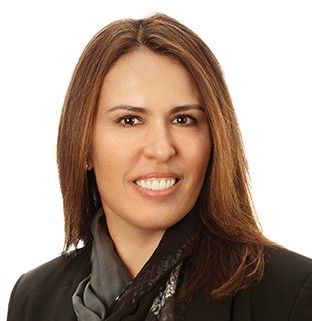
Tatiana Liceti
Vice President and Head of Americas Division,
Tetra Pak
Point of Impact
Ms. Liceti is drawn to outsized professional challenges, like managing Tetra Pak Peru’s commercial operations, because they push her to learn new things.
In 2004, six years after she joined the global packaging giant Tetra Pak, Tatiana Liceti’s big break materialized suddenly and unexpectedly.
She was working on the financial side of the business for the company’s division in Peru, happily making use of her MBA degree (from Babson College in Wellesley, Massachusetts) and her love of numbers. Then came the offer: How about taking over management of Tetra Pak Peru’s commercial operations?
Ms. Liceti described some of the thoughts that went through her mind: “What do I know about sales and marketing? Nothing. I know what I studied in college. It’s a big change from everything I’ve done so far. OK, shall I take the risk or not?”
“You need to find the way to really inspire your team and get them to understand the purpose behind the job.” —Tatiana Liceti
Ms. Liceti did not have much time to fully consider the offer. The powers that be at Tetra Pak informed her they needed her answer ASAP.
Fast forward to 2020. Ms. Liceti is now a company vice president, head of the Americas division and a member of Tetra Pak’s 14-person global leadership team. The company recorded $15 billion in sales in 2019, providing solutions for processing and packaging everything from dairy products and beverages to vegetables and pet food. Ms. Liceti’s division represented 26%, accounting for roughly $3.15 billion in annual sales.
Needless to say, the risk paid off handsomely for her (and Tetra Pak).
“I have never regretted it, not one day,” says Ms. Liceti, a native of Peru who works out of the division headquarters in Denton, Texas. “That was one moment that really changed my professional work. It required taking a big risk. It was really moving 100% from my comfort zone.”
In many ways, she had been preparing for her new role all of her life. Ms. Liceti says she has always been drawn to challenges—not just professionally but personally—because they push her to learn new things, to become a bit more versatile.
At Tetra Pak, where she has worked for 22 years, she has demonstrated that tendency by carefully watching how things work in other departments. While leading teams in Mexico, Peru and Colombia, she saw how the company operated in each country. That exposure prepared her for her 2019 promotion to lead Tetra Pak’s business in the Americas.
“If I had the chance to participate in a project or help somebody in a different area of expertise, I always thought why not just try to learn, see how things interact and how things get closer,” she says. “Then, you get a bigger picture of the business.”
And it is for that very reason, she says, that she has never denied any of her employees the opportunity to advance within Tetra Pak, even if their departure from her team creates challenges for her and other team members. Good leaders should help their people stretch and grow professionally, she says, “and you as a leader should be there, supporting them taking the next step.”
What other traits does a strong business leader need to possess? According to Ms. Liceti, she must be a good listener, taking to heart both the positive feedback and constructive criticism. She must encourage her team to find a healthy work-life balance—and then demonstrate that healthy work-life balance through her own actions. And she must bring energy and enthusiasm to the workday, which often proves infectious, she says.
“You need to find the way to really inspire your team and get them to understand the purpose behind the job.” Share on X says Ms. Liceti. “They do the work, and then that makes everything much easier because you will have your team really motivated and really wanting to make the difference.”
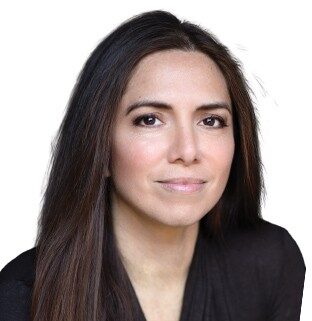
Nathalie Molina Niño
President, O3
Point of Impact
A serial entrepreneur and builder capitalist, Ms. Molina Niño is comfortable with risk, resilient despite setbacks and ready to move on after achieving a goal.
Years ago, a young woman was working with a group of scientists on a biodiversity study in the Amazon jungle—a passion project, for sure, but also a way for the young woman to become the crusading environmentalist she had seen in movies.
About halfway through, the scientists’ financial backers pulled their funding. Just like that, her dream job dried up. No new species discovered. No new insights into deforestation for Ms. Molina Niño.
“Suddenly, the romance of the world of the scientist was shattered,” says Ms. Molina Niño, an investor, advisor and serial entrepreneur based in New York City. “I learned very quickly that the scientists were not in control of their destiny. And it became clear that controlling my destiny was more important than being comfortable.”
That experience had such a visceral effect on Ms. Molina Niño that she has been neither controlled nor comfortable ever since.
She is president of O³ (Outcomes Over Optics), her family office dedicated to advancing economic equality by investing at the intersection of gender and climate. She is a consultant and a mentor, an author and an activist—not to mention one of People magazine’s most powerful Latinas of 2019.
She has been a coder and an entrepreneur, a playwright and a teacher. In 2012, Ms. Molina Niño co-founded Entrepreneurs@Athena, a program at the Athena Center for Leadership studies of Barnard College in New York that was created to level the playing field for women entrepreneurs.
“This quote is kind of my mantra: ‘You are the source of your own supply.’ I really believe that now. Even if I fall right on my [rear] and fail in some really big way, I’ll probably learn something, and I’ll probably find my way back on my feet.” —Nathalie Molina Niño
She has been the chief revenue officer of a tech startup (PowerToFly) and the founder of an investment firm (BRAVA Investments) that supports businesses with a direct economic impact on women. During her time as a senior director at Lionbridge Technologies, she co-led the growth of its largest business from $5 million in 2003 to nearly $100 million in 2009.
With every venture—there have been many others—Ms. Molina Niño embraced the essence of the entrepreneurial spirit: comfortable with risk, resilient after setbacks and motivated to start anew after reaching a goal.
“People say that to be an entrepreneur, there has to be a level of delusional optimism,” she says. “That’s probably what confidence looks like for me now that I no longer have the naive sense that everything I do will be successful, which I probably had when I was 20.
“I now have much more of a pragmatic view of just what the risks are, and I take them anyway, which is funny.”
All these roles have provided Ms. Molina Niño with opportunities for personal growth. That includes recognizing her strengths as a leader, which she says is “inspiring people by always creating forward movement and getting things done so they can see there is progress that we are building.”
And it has forced her to confront her limitations—which, she will tell you without prompting, include managing people. So she always hires a strong manager as her No. 2 because her employees “deserve to be managed by somebody who’s good at that.” And that frees Ms. Molina Niño to dream up even more big ideas, take even bigger risks and expect even greater success.
“This quote from Nuyorican opera legend Awilda Verdejo is kind of my mantra: ‘You are the source of your own supply.’ I really believe that now. Even if I fall on my [rear] and fail in some really big way, I’ll probably learn something, and I’ll probably find my way back on my feet.”
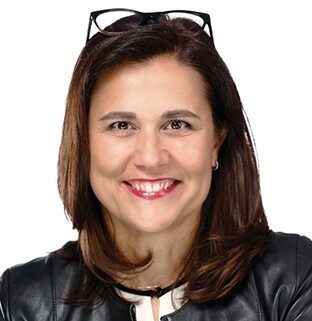
Régine Lucas
Senior Vice President
and Global Chief Procurement officer,
L’Oréal
Point of Impact
In spite of pandemic-related disruptions, Ms. Lucas is overseeing L’Oréal’s global supply chains, ensuring that its partners uphold the company’s ethical standards.
In January 2020, two things became clear to Régine Lucas. The COVID-19 pandemic was going to disrupt the supply chain for L’Oréal, the international manufacturer of cosmetics and other beauty products where she is a senior vice president and global chief procurement officer.
And amid those pandemic-related disruptions, Ms. Lucas and her teams would have a harder time securing resources and suppliers for the company, a priority for L’Oréal, which had sales of nearly €30 billion in 2019.
“As a team, we decided that during this crisis, there will be people who will behave well and people who will obviously not,” says Ms. Lucas, a native of France who works out of L’Oréal’s headquarters in suburban Paris. “I know who we want to be during this crisis, especially for our company’s ecosystem of suppliers. We have shortened the payment terms for the more fragile, donated hydroalcoholic gel, and found customized operational solutions to support the activity. And more importantly, we have kept personal interactions between our management teams to find our way in difficult times. We have also helped the French government in the supply of medical devices, as a citizen contribution.”
“The way we make the company profitable and competitive is as important as the numbers themselves. You always have a choice about how you conduct your business.” —Régine Lucas
Ms. Lucas has spent most of her career in procurement, marketing and finance at three multinational corporations. Those years have taught her something about global supply chains: namely, that negotiating prices takes up no more than 10% of her time. And the other 90%? Ms. Lucas says that is about creating shared value to build sustainable partnerships, supporting innovations, managing costs wisely, securing supplies and behaving ethically.
At L’Oréal, she supervises 850 employees and oversees the company’s interactions with 50,000 suppliers across the globe.
Her role is to ensure that those 50,000 commercial relations in the supply chain uphold her ethical standards and those of L’Oréal, which has appeared 11 times on the Ethisphere Institute’s list of the world’s most ethical companies.
L’Oréal has a long tradition of corporate responsibility and has been recognized as a top performer for its progressive social policies. This translates into how its products impact the environment, how the company treats its employees and how the company’s practices make the world a better place. L’Oréal strongly believes that fairness and inclusivity are part of building a more sustainable world.
Ms. Lucas’ teams have the responsibility to ensure those commitments are coherent along the entire supply chain, which involves evaluating suppliers’ performance, providing training, performing audits, as well as supporting multiple environmental and social projects. They work closely with corporate social responsibility teams worldwide and integrate sustainability objectives in teams’ bonuses.
“We are working with our business partners to help them improve their sustainable development performance and ensure their policies are as ambitious as L’Oréal’s,” says Ms. Lucas. “Hence, by 2030, we will ensure that 100% of our strategic suppliers’ employees will be paid at least a living wage, covering their basic needs and those of their dependents, and we will help an incremental 200,000 people from disadvantaged communities gain access to employment.”
“It is important to inspire buyers and suppliers and to show that it makes business sense to have an environmental and social impact,” says Ms. Lucas. “We have a lot of influence on our ecosystem and we can impact positively while being competitive. The way we make the company profitable and competitive is as important as the numbers themselves. You always have a choice about how you conduct your business.”
This article appeared in the Fall 2020 issue of Insigniam Quarterly. To begin receiving IQ, go here.

